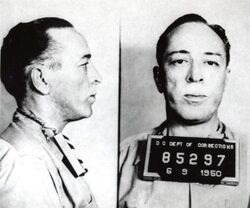Dalton Trumbo (nonfiction): Difference between revisions
| Line 16: | Line 16: | ||
<gallery mode="traditional"> | <gallery mode="traditional"> | ||
File:Dalton Trumbo 1947.jpg|link=Dalton Trumbo|[[Dalton Trumbo]] asks hard questions, demands answers | File:Dalton Trumbo 1947.jpg|link=Dalton Trumbo|[[Dalton Trumbo]] asks hard questions, demands answers. | ||
File:Hollywood Ten protest 1950.gif|link=Hollywood Ten (nonfiction)|[[Hollywood Ten (nonfiction)|Hollywood Ten]] demand justice. | |||
</gallery> | </gallery> | ||
Revision as of 18:56, 22 November 2016
James Dalton Trumbo (December 9, 1905 – September 10, 1976) was an American screenwriter and novelist.
As one of the Hollywood Ten, he refused to testify before the House Un-American Activities Committee (HUAC) in 1947 during the committee's investigation of Communist influences in the motion picture industry.
Trumbo won two Academy Awards while blacklisted; one (for Roman Holiday) was originally given to a front writer, and one (for The Brave One) was awarded to "Robert Rich", Trumbo's pseudonym.
Blacklisting effectively ended in 1960 when it lost credibility.
Trumbo was given credit for two blockbuster films: Otto Preminger made public that Trumbo wrote the screenplay for the smash hit, Exodus, and Kirk Douglas announced that Trumbo was the screenwriter of Spartacus.
President John F. Kennedy crossed American Legion picket lines to see Spartacus.
On December 19, 2011, the Writers Guild of America announced that Trumbo was being given full credit for his work on the screenplay of the 1953 romantic comedy Roman Holiday, almost sixty years after the fact.
In the News
Dalton Trumbo asks hard questions, demands answers.
Hollywood Ten demand justice.


